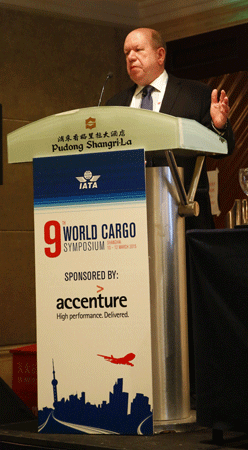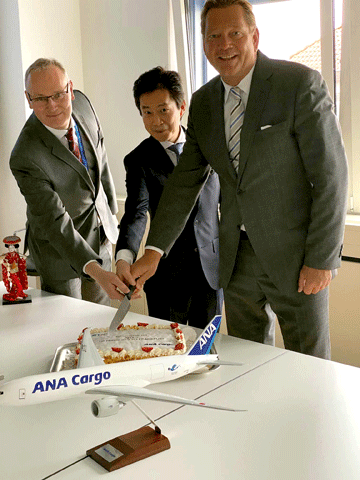|
When I am about to get depressed by the
isolation imposed by the pandemic, Geoffrey comes on line and asks me
to do something for him, thus providing me with an antidote as no healthcare
could.
This time he asked me to think who would
be my “airfreight heroes”.
I was unwittingly a few steps away from
the solution already and “my brilliant friend” Antonella Straulino
of Fedespedi pointed it out to me.
When she mentioned our good friend Lothar
Moehle, the combination of Lothar and hero set the aircraft inside me
on the runaway. I went back to my childhood heroes and my mind started
spinning as the propeller does in front of the airplane’s nose.
League of
Super Heroes
Lothar and Mandrake
were my dream-heroes. They shared the space in my heart with Superman
and, to a somewhat lesser degree, Batman. They were the perfect couple
fighting for positive ideals, superhuman strength and magic.
Such dreams amply compensated for
not having the right brand of shoes and made us happy anyway. Today these
childhood dreams can still shed a colourful light in the otherwise gloomy
days of pandemic isolation.
As I said, thanks to Antonella,
another Lothar came to my rescue this time: Lothar Moehle of DB
Schenker and he started the conversation by introducing DB Schenker,
the German conglomerate that was ranked by one survey as number 3 in the
world last year. In other words, this is one of the top LSP’s in
business and certainly has first-hand information on how air cargo runs
in these challenging times.
Service Experience At The Right
Time
Lothar Moehle is the Chair of the CLECAT
Air Logistic Institute and Board Member of Cargo
iQ, he is also Director for AVSEC and Governance Global Air Freight
in DB Schenker.
Reaching Across Borders
Lothar has been a friend for a number of
years, starting when I was at CLECAT in Brussels and afterwards when I
was at FIATA in Zurich.
AVSEC brought us together as we kept meeting
at the same places all the time. I remember I was always insisting that
we should talk about “safety and security” at some time. This
concept comes in handy right now, in this time when the threats have changed,
perhaps becoming even greater than before and encompassing both security
and safety issues connected with passengers’ heath. I had always
been hoping for a holistic approach to safety and security, and that was
clear in my conversations with Lothar, whom I respected for being immensely
knowledgeable, and always willing to share in and work for the “common
good”.
So my first question was: Lothar, who would
your heroes be in this period, which is posing challenges we had never
thought possible and would have surely preferred to avoid?
Health Care Heroes At Every Turn
Lothar was extremely clear in this answer,
which left no room for doubt in its simple and matter of fact approach:
“In the present pandemic situation,
heroes are in my opinion the nurses, the doctors and the care workers
in the world, who are often disregarding their own safety and health to
help people in desperate need.
“You may add to this category others,
such as the women and men working in the offices of airlines, forwarders
and GHA’s, who cannot work from home, but who are determined to
get the shipments moved to where the goods are required. Many of our staff
have been allowed to work from home in order to limit the risk for them
and the community, but not everyone had that option.”
Front Line People Going Above & Beyond
“Also importantly involved on the
front line are women and men working in warehouses, the loaders on the
PAX aircrafts and freighters, who are working hard – often at odd
hours and weekends – to do their utmost to get personal protective
equipment distributed globally, in order to alleviate the shortage of
PPE which has emerged almost everywhere in the world. Let us add to this
the truck drivers, who are now working seven days a week and find next
to no respite when they want to stop for a coffee or bio-break: shops
and facilities are closed because of the lockdown, so they count themselves
lucky when they find what they need, yet they do not give up. These are
in my view today’s heroes and we should be grateful to them.”
Lothar’s reply was almost just the
same, multifaceted yet inevitable, when asked what must the air cargo
business do now and post-pandemic to come back stronger than ever. In
the subtext of his answer we can hear the usual passengers vs. cargo tête-à-tête
chiming in. Maybe air cargo will show more resilience than passengers
this time? Maybe.
Things To Come Post Pandemic
Lothar said, “the future look of the
air industry will be evolving, in time progressively moving a distance
away from the immediate picture, which is rather gloomy at the moment.
Airlines have grounded a large number of planes due to the lack of passengers
and this simply means fewer wings in the air; switching back to pre-corona
virus flight schedules will most likely not happen within the foreseeable
future, it may take much longer than we would want, due to the lack of
passenger demand.
“Even when restrictions are eased,
tourists will most likely stay in their own countries for fear of the
virus and possibly a number of other uncertainties, such as new travel
restrictions and flight embargoes between and within countries.”
 |
A Cautious Way Forward
“A cautious approach will prevail,
at least initially, with careful planning of tourist travel. Job losses
or the fear of losing jobs may also play a part in making the potential
traveller less inclined to spend on travel, when other priorities are
more urgent.
“Business travel could also start
in much smaller numbers as companies have seen that a lot of face-to-face
meetings can be done virtually online and do not require all the travelling
we were used to. Companies might also have to reduce business travel due
to economic constraints.”
Comeback Will be Measured
On my questioning look, Lothar added the
following observation: “Once flights are back to normal, or something
like it, planes will not be fully booked initially, and it is likely that
more routes with planned stop-overs will need to be scheduled, so the
development of a viable route may create a different paradigm in flight
schedules.
“Airlines realize from the present
pandemic that the cargo operation is the only lifeline they have right
now. This hopefully will result in airlines’ attention and investments
to the cargo sector of the business in their future strategies.
“This also means that the airlines
will need to have much more awareness of the requirements of cargo operations
on the ground and at the airports. This area of business could become
more attractive in the future.”
I asked Lothar whether anything of what
we are accustomed to will definitely be lost.
“Older (e.g. B 747) and / or uneconomic
(e.g. A 380) aircraft will be retired far earlier than initially planned
or will be consigned for long-term storage to the desert. In some trade
lanes the deployment of wide-body aircraft might not be a viable option
any longer. Instead, narrow body aircraft will be used more regularly
and this will lead automatically to insufficient cargo capacity.
“In response to the greater demand, more
airlines might be willing to convert passenger planes into CAO’s
(cargo aircraft only) in order to make use of the existing grounded aircraft
fleet, pilots and crews.”
Lessons Learned
“The industry must review the over arching
lessons learned; every stakeholder has to draw their own conclusion, but
chances are that the industry has already, or will change drastically
in the future: some importers might even review their JIT strategy and
policy by keeping either a larger stock “nearby” or relocating
production, so as to develop a certain degree of independence from the
transportation links, regardless of the mode of transport.”
Watch The Importers
Lothar Moehle also suggested that, “on
a short term basis, it might very well be that some importers will change
from Air Freight to Ocean Freight or Rail for their transportation needs,
due to the lack of available cargo space and rate structure. Subject to
the downturn of economies on a global basis, this might have a long-term
effect on the transportation costs overall, as well as on the space made
available. Let us face it, disrupted supply-and-demand patterns may take
longer than days or weeks to return to the ‘new normal’.”
Hope & Faith Needed In New
Tech
Lothar was adamant on one point: “As the
entire industry is changing substantially, the present contraction in
business will lead to the arrival of new technologies in a quicker manner.
Resources, be it in financial means or in personnel and facilities, will
be even scarcer, but the requirements to do business will be ever increasing.
All this means fresh investments in CAO (cargo aircraft only), ground
handling equipment, but also in IT infrastructure such as eAWB, messaging
capabilities such as XML standard, tracking & tracing in real time,
IATA One Record initiative, etc. The industry must stand up to this challenge
and we believe Logistics Service Providers will be doing just that.”
Thanks to my interlocutor’s kindness I
had a bit more time to ask an open question: what have we learned with
Cargo In Cabin (CIC)?
 Cargo
In Cabin Assesment Cargo
In Cabin Assesment
Lothar Moehle was quick to offer his view: “Nobody
can ignore that the air cargo industry can react quickly to profoundly
changed circumstances. What we see in this evolving scenario is that some
stakeholders in the industry are trying to implement new, often higher
fees and are not necessarily honouring their existing, long standing contracts,
invoking Force Majeure. It is clear that in some cases this is a behaviour
that is an attempt to mitigate the current situation, however it is without
sufficient reflection on the consequences it has on other stakeholders.”
Proactive Governments Welcome
However, Lothar showed appreciation for the understanding
of the governing bodies: “Authorities,
such as the EU Commission and the National and Customs Authorities have
been, by and large, very proactive and flexible to ensure that urgently
needed Healthcare Supplies could be transported without administrative
red-tape. Operating a PAX aircraft for cargo only is subject to licensing
by the appropriate authorities, in line with national and international
regulatory requirements, such as the number and training of the flight
attendants on board. In many situations the necessary solutions were found.”
CIC New Brand of Hand Work
On the other hand, some practical issues were
also underscored: “The operational costs of a PAX flight are higher
due to the required double flight crews on board, while still having a
payload which is nowhere near a full-freighter’s. As long as the
rates are sufficient, it is a viable option for the airlines right now,
as the aircraft is there anyway. “The
more PAX cargo space is available, the greater impact this might have
on the overall rate levels. This being said, due to the construction of
PAX aircrafts (e.g. door size, strength of floor) the usage of the plane
of the cabin is limited to very light cargo. Also the loading and unloading
by hand requires a greater number of loaders. In the current situation
having to observe the so called ‘social distancing’ rules,
has an impact on the productivity of the process.”
A Temporary Path?
It was clear to me that my interlocutor
was not seeing the use of passenger aircraft for cargo usage as a regular
feature in our future business, so I did not wish to insist on this point,
which can probably be viewed as a somersault in a business that has taken
a really bad and unexpected blow.
There is also another way of looking at
this: the airline business is not showing any intention of giving up or
spending much time whining and wailing; on the contrary, it is showing
us the remarkable resilience of the fighter who never throws the sponge.
There has been quite some debate on the issue of combi aircraft, which
is another way of looking at the same question: passengers and cargo,
how do we make both of them fly in future, and in what mix?
A Holistic Approach
Lothar's response is, “that the ‘holistic
approach’ will prevail. We have already seen this after 9/11; I
clearly remember the moment when we had no idea how we could make people
fly safely again, but in a relatively short time we devised the systems
which made it possible. I am confident the same will happen again this
time. Billions of travellers have adapted to being scanned and checked
for security reasons each and every time they take another plane: what
seems today a completely normal procedure was inconceivable before 2001.
“In my view passengers (and the industry)
will adapt to the novel requirements that will ensure their safety on
board. Time is what is needed for change to set in and for people to adapt.
It will not be very long: everything will be slightly different and will
appear to be normal to everyone again, trust me. And in the long run,
this will put cargo back where it was: in the hold.”
 Epilogue: Epilogue:
I am very grateful to my friend Lothar for
patiently taking my probing questions. His insights have been instructive
and have provided food for thought for all of us. My congratulations to
the exquisite professional and to his successful enterprise.
Marco L. Sorgetti
|




 Max Conrady, (L) Fraport, Senior Vice President Cargo; Hiro Murai, ANA Cargo,
Manager Cargo EMEA; and Ingo Zimmer CEO, ATC Aviation Services after the
water cannon salute, celebrate ANA Cargo’s first dedicated Boeing
777 freighter arrival from Tokyo to Frankfurt on Wednesday June 10.
Max Conrady, (L) Fraport, Senior Vice President Cargo; Hiro Murai, ANA Cargo,
Manager Cargo EMEA; and Ingo Zimmer CEO, ATC Aviation Services after the
water cannon salute, celebrate ANA Cargo’s first dedicated Boeing
777 freighter arrival from Tokyo to Frankfurt on Wednesday June 10.

 “The global pandemic has caused us to postpone our event until 2020,”
declared Byung-Jin, Chairman of KIFFA. While saddened by this delay, we
wish our colleagues good health and deliverance from this terrible pandemic,
while looking ahead to greeting everyone in Busan, a welcoming, exciting
city of leading port & logistics, arts and culture, in the Republic
of Korea.” Next year (2021) the FIATA World Congress will be held
in Brussels, Belgium October 26-29.FIATA also said FWC 2023 will be held
in Panama City, Panama . . .
“The global pandemic has caused us to postpone our event until 2020,”
declared Byung-Jin, Chairman of KIFFA. While saddened by this delay, we
wish our colleagues good health and deliverance from this terrible pandemic,
while looking ahead to greeting everyone in Busan, a welcoming, exciting
city of leading port & logistics, arts and culture, in the Republic
of Korea.” Next year (2021) the FIATA World Congress will be held
in Brussels, Belgium October 26-29.FIATA also said FWC 2023 will be held
in Panama City, Panama . . .  Tell
us something that we already didn’t know Dept.: “Air cargo operations
at Frankfurt Airport are running at full speed during the crisis,”
said Harald Gloy, Chairman of the Board of Air Cargo Community Frankfurt
e.V. and Board member of Lufthansa Cargo AG. “We moved 3.5 billion
respiratory protection masks and other PPE equipment across 22,000 shipments
plus medical equipment and pharmaceuticals, as well as urgently required
industrial goods, post, packages and food for the German and European markets.
Demand for (inbound) cargo capacity (PPE) remains high.” Exports from
Germany have fallen by 20 percent since March. That means that the most
crucial air cargo is missing. “We are a long way from normal (two-way)
flight operations,” said Gloy.
Tell
us something that we already didn’t know Dept.: “Air cargo operations
at Frankfurt Airport are running at full speed during the crisis,”
said Harald Gloy, Chairman of the Board of Air Cargo Community Frankfurt
e.V. and Board member of Lufthansa Cargo AG. “We moved 3.5 billion
respiratory protection masks and other PPE equipment across 22,000 shipments
plus medical equipment and pharmaceuticals, as well as urgently required
industrial goods, post, packages and food for the German and European markets.
Demand for (inbound) cargo capacity (PPE) remains high.” Exports from
Germany have fallen by 20 percent since March. That means that the most
crucial air cargo is missing. “We are a long way from normal (two-way)
flight operations,” said Gloy.

